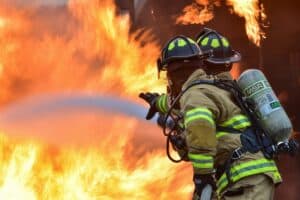Whether you are a landlord, property owner or property management company, you have to be aware of the Fire Code obligations and ensure that the requirements are upheld.
The issue for most is how to get a tenant to cooperate. This is especially a concern when you are managing multiple units or for property managers and companies that manage an entire building.
According to the Fire Code, inspections must be conducted as frequently as monthly to annually, depending on the section of the Code in question.
As defined in the Fire Code, “inspection means physical examination to determine that the device or system will apparently perform in accordance with its intended function.” This obligation falls on the “owner” of a property, which is defined as “any person, firm or corporation having control over any portion of the building or property under consideration and includes the persons in the building or property.”
This responsibility proves difficult when a landlord or property manager must physically attend multiple units, sometimes over hundreds of units in a single building, in order to conduct these inspections. Many, therefore, simply take steps that they believe to be reasonable enough to ensure compliance.
Case in point: City of Toronto v. York Condominium Corporation No. 60
A fire started in one of the units at the condominium which was later found to not have a smoke alarm in the unit at all. The Fire Marshall charged both the unit owner and the condominium corporation for failure to ensure the unit had a smoke alarm, an offence under the Fire Code.
Based on the Fire Code provisions as defined above, the court stated that,
“This case being about smoke alarms is about fire. Fire does not respect the division of control in condominium law. The purpose of the smoke alarm regulation is to carry out the intent and purpose of the Fire Marshall’s Act.”
Even though the condominium corporation took steps to encourage compliance, going so far as to getting smoke alarms for unit owners to purchase at a lower price, it was not enough. Compliance was not physically confirmed for all units; therefore, the condominium corporation was still liable for an offence.
Lesson Learned
No matter your role, it is always advisable to consult fire safety professionals regarding Fire Code compliance measures – there are no short cuts when it comes to compliance.
Speaking to experienced legal counsel may also provide insight as to what courts look for when assessing compliance.
In the worst-case scenario, if you are charged with an offence, do not wait and act quickly by speaking to experienced counsel who can guide you through the process of Fire Code offences.
Disclaimer: Information made available on this website in any form is for information purposes only. It is not, nor is it intended to replace, legal advice. Contact Chu & Huang Law to discuss a specific legal issue and please note that contacting Chu & Huang Law, on its own, does not create a lawyer-client relationship.





Recent Comments